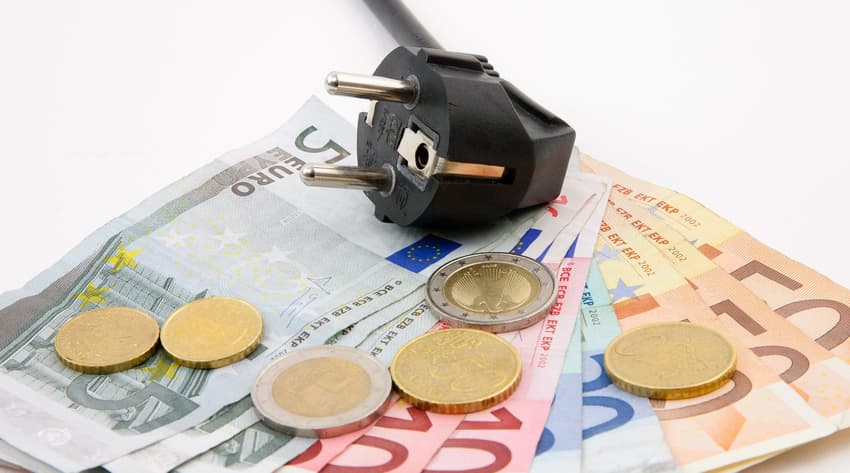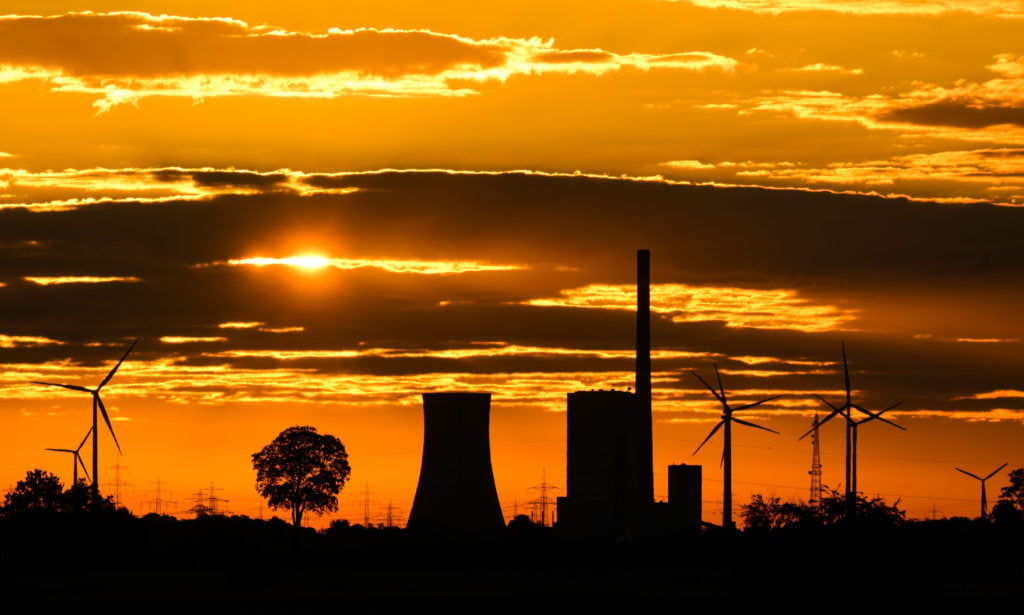EXPLAINED: How Germany wants to reduce electricity prices for consumers

Electricity prices in Germany have roughly doubled since the start of the year and are continuing to rise. A proposed electricity price brake aims to relieve consumers from the extra financial pressure. Here's what we know so far.
What's happening?
Consumers in Germany are currently seeing huge increases in electricity prices. Anyone signing a new electricity contract now will pay around 53 cents per kilowatt hour while a year ago, electricity cost less than half of that. Those with an existing contract usually still pay a lower price - but suppliers are soon likely to adjust prices to the current market level.
Manuel Frondel, Professor of Energy Economics at the Ruhr University in Bonn, told the Rheinische Post that the price of electricity will continue to rise in the autumn.
"Looking ahead to autumn and winter, I can't give consumers any hope that electricity prices will get lower for the time being," he said.
READ ALSO: German electricity prices to soar by 25 percent on average
"In the autumn and winter, many consumers heat with electricity...and if half of the nuclear power plants in France still fail in the autumn and winter, then electricity prices on the stock exchange may well reach unimagined heights."
Why is electricity getting more expensive?
Both the war in Ukraine and the extreme weather conditions this summer are impacting the electricity price in Germany.
Although gas-fired power plants only contribute around 10 percent to electricity generation in Germany, the sky-high price of gas as a result of the scarcity of cheap Russian gas is dragging up the price of electricity.
READ ALSO: EXPLAINED: How customers in Germany can tackle rising electricity bills
Another important reason for the high electricity prices is that Germany is currently exporting an unusually large amount of electricity to other EU countries.
Austria, for example, is dependent on German imports because hydroelectric power plants are producing less electricity than usual due to the dry rivers. In France, numerous nuclear power plants are down - in part also because of the drought, which is jeopardising the supply of cooling water needed for the operation of the plants.
What are the proposed measures - and would they help residents?
The latest package of relief measured agreed by the ruling traffic light coalition on Sunday includes an electricity price cap for ‘basic consumption’ at around 30 cents per kilowatt hour.
This would mean that, for a certain amount of electricity use, a discounted price would apply. For additional consumption beyond that, the price would not be capped.
According to a sample calculation published by Federal Minister of Justice Marcus Buschmann, an electricity price cap would mean that a family with a consumption of 5,000 kWh would save €346 compared to the average electricity price in August (39.9 cents/kWh), and a single household with a consumption of 1,500 kWh would save €141.

Chancellor Olaf Scholz (SPD), Omid Nouripour, Federal Chairman of Bündnis 90/Greens, Saskia Esken Federal Chairman of the SPD, and Christian Lindner, FDP Federal Chairman and Federal Minister of Finance, at the press conference following the deliberations on the third relief package on September 4th. Photo: picture alliance/dpa | Michael Kappeler
However, it is still unclear whether the electricity price brake will apply to all households - as the coalition committee's resolution paper actually suggests - or only to those with low incomes.
READ ALSO: What’s in Germany’s support package for rising energy bills?
The plan is to finance the price brake by skimming off the top of energy company profits, though exactly how this will work also remains unclear.
In his summer interview with ZDF, Chancellor Olaf Scholz said that this depends on developments in the electricity markets, which are hard to predict.
"If such coincidental, excess profits occur there on a large scale, we have many, many billions to give back to the citizens," he said.
So far, however, no details are known about the energy companies from which the "price brake" is to be financed. The only thing that is certain is that the price of electricity on the stock market is always based on the cost of the most expensive power plant required to generate the electricity - the so-called "merit order".
As a general rule, the most expensive suppliers are gas-fired power plants.
The German government is hoping that such a price brake instrument will be agreed upon quickly for the entire EU and on Friday, the EU energy ministers will discuss the issue.
But If the measures "cannot be agreed upon and implemented in a timely manner," the German government wants to implement them itself.
It is also unclear when the new mechanism will take effect.
What are Germany's electricity sources?
The importance of renewable energy sources for Germany's electricity supply has risen steadily in recent years.
In the first half of 2022, renewable energies covered a total of around 49 percent of gross domestic electricity consumption. By way of comparison, in 2011, electricity from solar panels, wind turbines, biogas and hydroelectric power plants only accounted for around 20 percent of total energy production.
Lignite and hard coal also remain an important factor in German electricity generation and account for around 30 percent of the electricity supply. But since the beginning of August, no more Russian coal has been imported into Europe. Although coal can be replaced much more easily than gas, these supply streams also have to be established first, especially since Germany's demand for coal is likely to increase.

The sun rises between clouds behind Mehrum power plant in the Peine district. The coal-fired power plant has been back on
Since the beginning of the war in Ukraine, Germany has brought two hard-coal-fired power plants back online: the Mehrum power plant in Hohenhameln, Lower Saxony and the Heyden power plant in Petershagen, North Rhine-Westphalia.
What about nuclear power?
Electricity is still generated by nuclear power plants in Germany, albeit to a lesser extent: the three nuclear power plants Isar 2, Emsland and Neckarwestheim 2 currently still account for around six percent of the electricity supply.
As reported by The Local, the German Finance Minister Robert Habeck (Green) announced on Monday that, despite plans to end nuclear power in Germany for good by the end of 2022, the two nuclear power plants Isar 2 in Bavaria and Neckarwestheim in Baden-Württemberg are to remain on operational standby until April 2023.
Habeck wants to leave the decision of whether the reactors should really continue to generate electricity open until the new year, so that Germany could be better protected against possible further difficulties with electricity supply.
With reporting by AFP.
Comments
See Also
What's happening?
Consumers in Germany are currently seeing huge increases in electricity prices. Anyone signing a new electricity contract now will pay around 53 cents per kilowatt hour while a year ago, electricity cost less than half of that. Those with an existing contract usually still pay a lower price - but suppliers are soon likely to adjust prices to the current market level.
Manuel Frondel, Professor of Energy Economics at the Ruhr University in Bonn, told the Rheinische Post that the price of electricity will continue to rise in the autumn.
"Looking ahead to autumn and winter, I can't give consumers any hope that electricity prices will get lower for the time being," he said.
READ ALSO: German electricity prices to soar by 25 percent on average
"In the autumn and winter, many consumers heat with electricity...and if half of the nuclear power plants in France still fail in the autumn and winter, then electricity prices on the stock exchange may well reach unimagined heights."
Why is electricity getting more expensive?
Both the war in Ukraine and the extreme weather conditions this summer are impacting the electricity price in Germany.
Although gas-fired power plants only contribute around 10 percent to electricity generation in Germany, the sky-high price of gas as a result of the scarcity of cheap Russian gas is dragging up the price of electricity.
READ ALSO: EXPLAINED: How customers in Germany can tackle rising electricity bills
Another important reason for the high electricity prices is that Germany is currently exporting an unusually large amount of electricity to other EU countries.
Austria, for example, is dependent on German imports because hydroelectric power plants are producing less electricity than usual due to the dry rivers. In France, numerous nuclear power plants are down - in part also because of the drought, which is jeopardising the supply of cooling water needed for the operation of the plants.
What are the proposed measures - and would they help residents?
The latest package of relief measured agreed by the ruling traffic light coalition on Sunday includes an electricity price cap for ‘basic consumption’ at around 30 cents per kilowatt hour.
This would mean that, for a certain amount of electricity use, a discounted price would apply. For additional consumption beyond that, the price would not be capped.
According to a sample calculation published by Federal Minister of Justice Marcus Buschmann, an electricity price cap would mean that a family with a consumption of 5,000 kWh would save €346 compared to the average electricity price in August (39.9 cents/kWh), and a single household with a consumption of 1,500 kWh would save €141.

However, it is still unclear whether the electricity price brake will apply to all households - as the coalition committee's resolution paper actually suggests - or only to those with low incomes.
READ ALSO: What’s in Germany’s support package for rising energy bills?
The plan is to finance the price brake by skimming off the top of energy company profits, though exactly how this will work also remains unclear.
In his summer interview with ZDF, Chancellor Olaf Scholz said that this depends on developments in the electricity markets, which are hard to predict.
"If such coincidental, excess profits occur there on a large scale, we have many, many billions to give back to the citizens," he said.
So far, however, no details are known about the energy companies from which the "price brake" is to be financed. The only thing that is certain is that the price of electricity on the stock market is always based on the cost of the most expensive power plant required to generate the electricity - the so-called "merit order".
As a general rule, the most expensive suppliers are gas-fired power plants.
The German government is hoping that such a price brake instrument will be agreed upon quickly for the entire EU and on Friday, the EU energy ministers will discuss the issue.
But If the measures "cannot be agreed upon and implemented in a timely manner," the German government wants to implement them itself.
It is also unclear when the new mechanism will take effect.
What are Germany's electricity sources?
The importance of renewable energy sources for Germany's electricity supply has risen steadily in recent years.
In the first half of 2022, renewable energies covered a total of around 49 percent of gross domestic electricity consumption. By way of comparison, in 2011, electricity from solar panels, wind turbines, biogas and hydroelectric power plants only accounted for around 20 percent of total energy production.
Lignite and hard coal also remain an important factor in German electricity generation and account for around 30 percent of the electricity supply. But since the beginning of August, no more Russian coal has been imported into Europe. Although coal can be replaced much more easily than gas, these supply streams also have to be established first, especially since Germany's demand for coal is likely to increase.

Since the beginning of the war in Ukraine, Germany has brought two hard-coal-fired power plants back online: the Mehrum power plant in Hohenhameln, Lower Saxony and the Heyden power plant in Petershagen, North Rhine-Westphalia.
What about nuclear power?
Electricity is still generated by nuclear power plants in Germany, albeit to a lesser extent: the three nuclear power plants Isar 2, Emsland and Neckarwestheim 2 currently still account for around six percent of the electricity supply.
As reported by The Local, the German Finance Minister Robert Habeck (Green) announced on Monday that, despite plans to end nuclear power in Germany for good by the end of 2022, the two nuclear power plants Isar 2 in Bavaria and Neckarwestheim in Baden-Württemberg are to remain on operational standby until April 2023.
Habeck wants to leave the decision of whether the reactors should really continue to generate electricity open until the new year, so that Germany could be better protected against possible further difficulties with electricity supply.
With reporting by AFP.
Join the conversation in our comments section below. Share your own views and experience and if you have a question or suggestion for our journalists then email us at [email protected].
Please keep comments civil, constructive and on topic – and make sure to read our terms of use before getting involved.
Please log in here to leave a comment.